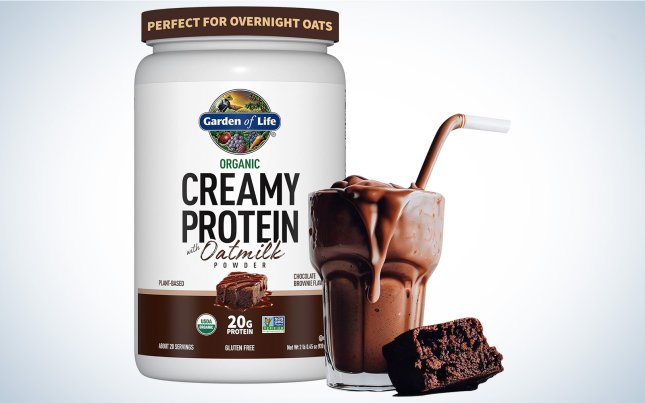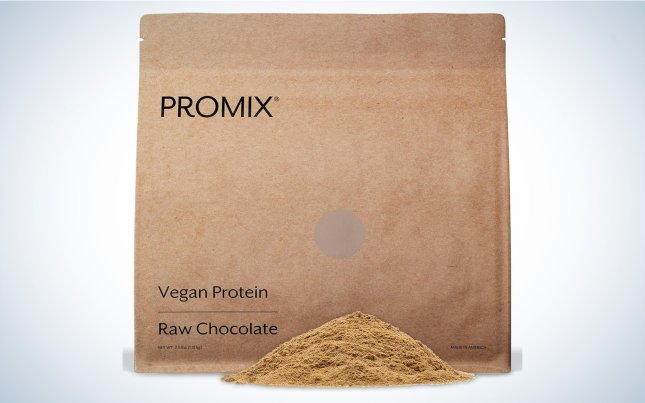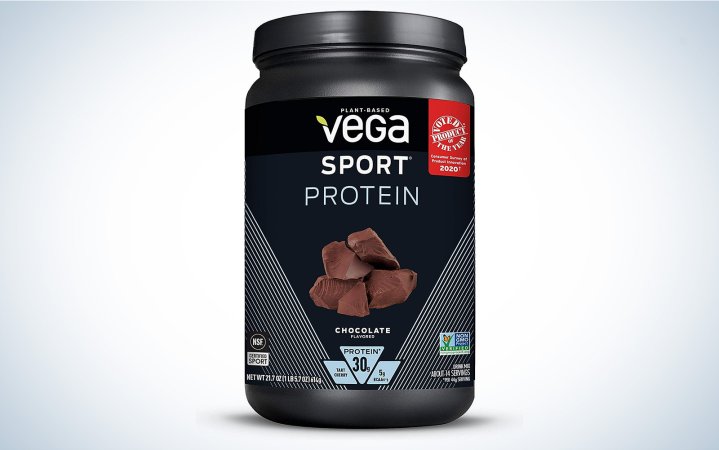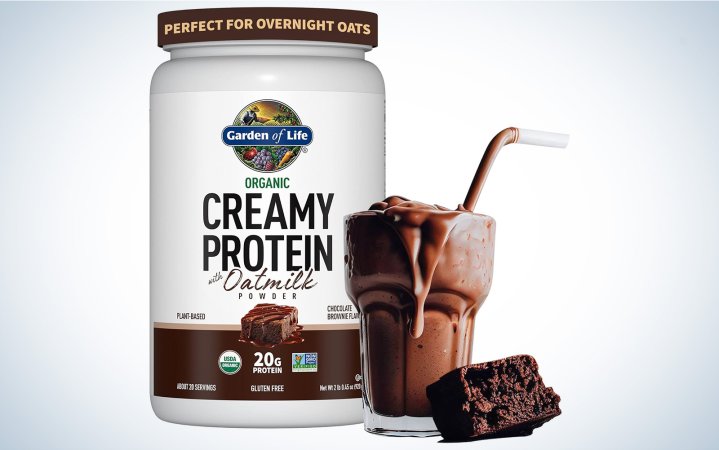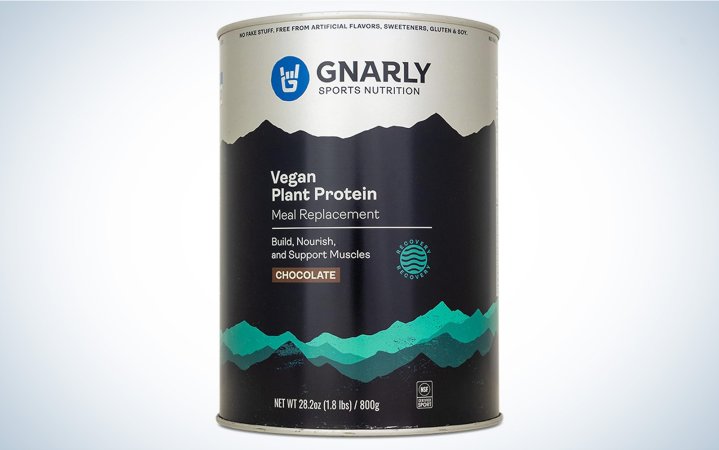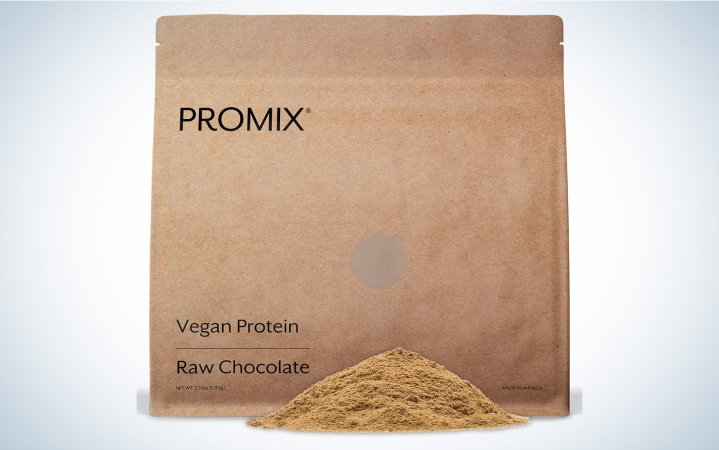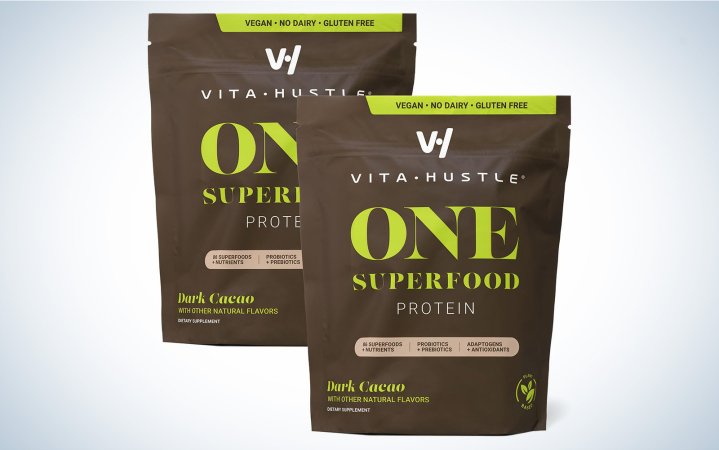We may earn revenue from the products available on this page and participate in affiliate programs. Learn more ›
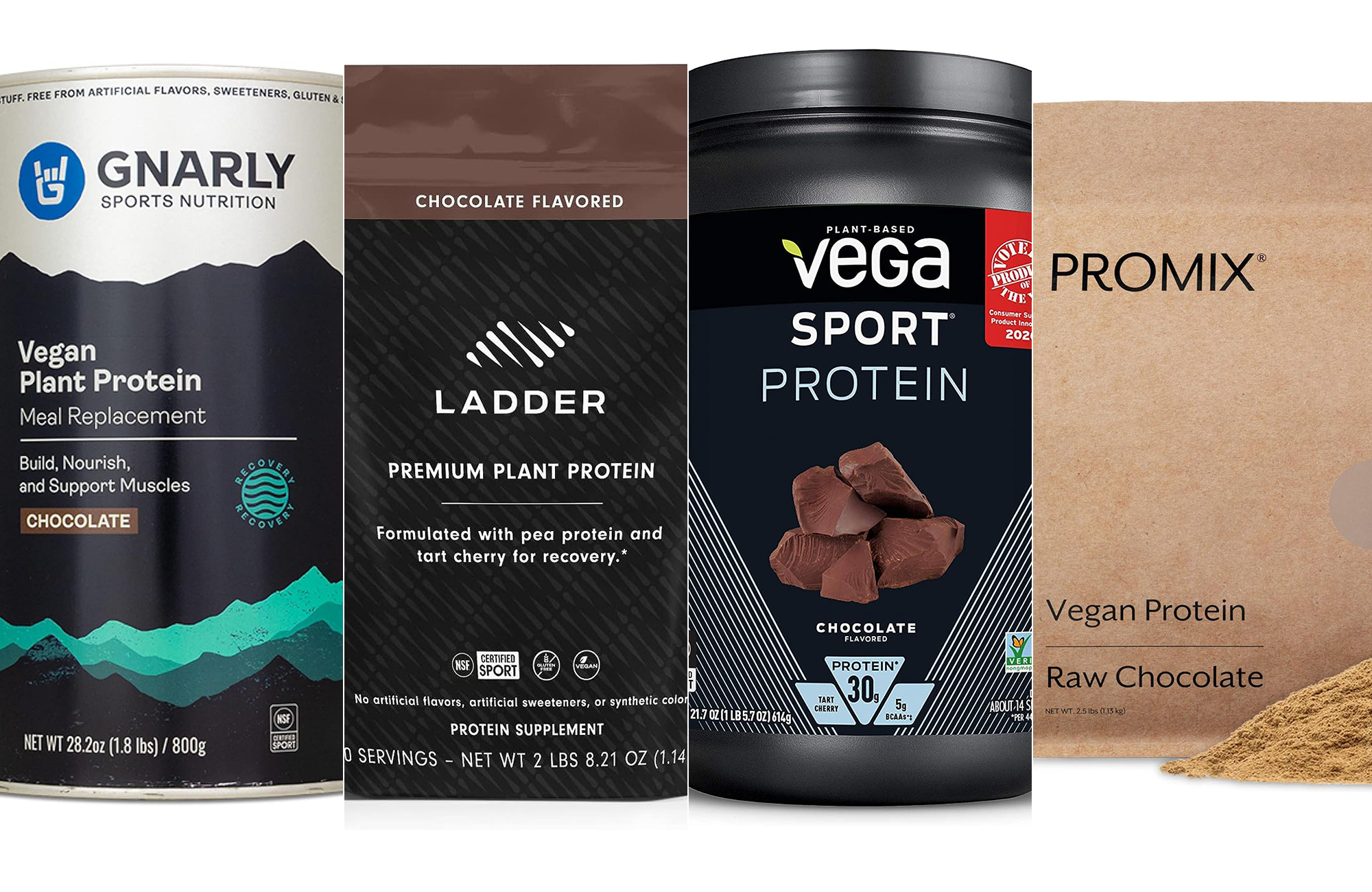
The plant-based bandwagon has been picking up a lot of passengers these last few years, which has led to an abundance of vegan protein powders on the market. But, the workout supplement landscape can be tricky to navigate. It’s full of expensive scams and misinformation. Plus, the rise of well-meaning but unqualified foodies and fitness influencers across the Internet has made it difficult to discern fact from fiction. We’re here to help you sort it out. Whether you’re throwing haymakers on the heavy bag or trying to PR on your deadlift, we found five vegan protein powders that will support your every workout.
- Best overall: Vega Sport Chocolate
- Best tasting: Garden of Life: Creamy Oat Chocolate Brownie
- Best meal replacement: Gnarly Vegan Chocolate
- Best for sensitive stomachs: Promix Vegan Raw Chocolate
- Best after an interval workout: Ladder Chocolate
- Also worth a look: VitaHustle ONE SuperFood
How we chose the best vegan protein powder
PopSci has multiple staff members who are vegetarian and explore animal protein alternatives, while I’ve been an active athlete since childhood and have been vegan most of my adult life. I filtered my search to performance supplements that are purely plant-based. I’m also a Columbia-educated registered dietician. I focused my search on products with ingredients that are accurately labeled, which can be tricky since the FDA doesn’t regulate protein powder in the same way it regulates regular food. Therefore, I relied on supplements certified by NSFSport, trusted by USADA (United States Anti-Doping Agency) and most major league sports associations, to verify product authenticity and suitability for athletes. You’ll notice I chose the chocolate flavors of each brand because that’s what I find best fits the most common peanut butter and banana “recipe” many of us use for protein smoothies (most brands only carry a chocolate and vanilla flavor in their vegan selection, anyway). Finally, as I reviewed the available options, I made sure to account for differences in things like packaging, allergens, and price.
Here’s that easy, delicious smoothie recipe:
- 12 oz Britta water
- 1 large banana
- 2 ice cubes
- Teaspoon of peanut butter
- Dash of vanilla extract
- Shake of cinnamon
- Shake of cloves
The best vegan protein: Reviews & Recommendations
While we make specific recommendations, it’s important to consider your needs and tastes. Be sure to check out all the options on the list before ordering.
Best overall: Vega Sport Chocolate
Vega vegan protein powder
Pros
- High absolute and relative protein content (second highest of all reviewed)
- Has 2.5 g of leucine, which is important for stimulating MPS (muscle protein synthesis)
- Simple ingredients make it less likely to upset your stomach
- Tart cherry, a powerful antioxidant, can help aid in recovery
Cons
- Not personally a huge fan of the stevia taste, but it’s not bad
Specs
- Protein per serving: 30g
- Carbs per serving: 6g
- Fat per serving: 3g
- Calories per serving: 160
- Cost per serving: $1.92
The Vega brand carries a lot of weight in the world of vegan athletics because of its co-founder, Brendan Brazier—a former ultra-endurance athlete who helped prove the competitive viability of a plant-based lifestyle. This protein powder looks like it’s formulated to help you maintain that competitive edge. It got top billing on this list because of its high protein content, GI-safe ingredients, and adequate leucine content—important traits for any protein supplement. It comes stacked with 30 grams of protein per 44 gram serving (a ratio of 0.682 per gram) and 2.5 grams of leucine, which is important for stimulating muscle protein synthesis. It’s also free of the pro- and prebiotics, often the cause of GI disturbances, found in the more expensive “Premium” version. It doesn’t skimp on vitamins with 7 milligrams of iron and 20% of your daily calcium needs. I remember the early Vega protein powders in the mid-2000s and, I’ll be honest, they weren’t great. This has come a long way in taste and texture with a subtle, chocolatey flavor not overly affected by that distinct stevia taste. It blended well with the rest of my smoothie ingredients without getting too frothy. I’m not a fan of “froth” because it just puts my air in your stomach, causing most people to feel bloated. Finally, at only $29.99 for the standard tub, Vega’s Sport Protein – Plant-Based Protein Powder Chocolate does all I need it to do as a vegan athlete.
Best tasting: Garden of Life: Creamy Oat Chocolate Brownie
Garden of Life: Creamy Oat Chocolate Brownie
Pros
- Oat milk does just what it says—gives it a creamy taste
- Fully organic, non-GMO product
- Trusted brand that has been around a long time
Cons
- The protein-to-powder ratio is a little low compared to competitors
- Pro- and prebiotic blend can upset the stomach of a person with a normal GI tract or IBS
Specs
- Protein per serving: 20g
- Carbs per serving: 16g
- Fat per serving: 4.5g
- Calories per serving: 170
- Cost per serving: $2
Taste is a huge factor when considering a supplement because, let’s be honest, if it tastes bad, you’re probably not going to take it. The Garden of Life Creamy Organic Vegan Protein Powder + OatMilk is not that chalky protein powder of old. The coconut and oat milk powders give it a silky and creamy flavor that tastes pretty close to an actual milkshake. And, I’m not a chef, but there’s this nutty character of the chocolate that I’m guessing comes from the gluten-free grains they use for extra protein—brown rice, amaranth, quinoa, buckwheat, millet, and chia. Now, as someone who tries to get a pretty high amount of protein in his body every day, I do wish it had a bit more than 20 grams per serving (a ratio of 0.435 per gram), especially since vegan athletes have a slightly less access to bioavailable proteins. It also has a number of ingredients like erythritol (sugar alcohol), inulin, acacia gum, and a probiotic blend that can cause bloating or GI irritation for some people. Still, Garden of Life has been around a long time and makes a host of products that are independently verified to be as authentic, organic, and generally good for you as they try to be. If you get a good amount of protein in your diet and just want a bit extra through a delicious, organic shake, this is a good bet.
Best meal replacement: Gnarly Vegan Chocolate
Gnarly Vegan Chocolate
Pros
- Higher overall calories and a broad macronutrient profile
- Contains widest array of micronutrients, including biotin, vitamin D, and iron
- Includes more than 30% of daily fiber needs (9 grams)
Cons
- Larger serving size means you’ve got a lot of powder to chug
- Higher fat content than the others on the list
Specs
- Protein per serving: 20g
- Carbs per serving: 16g
- Fat per serving: 7g
- Calories per serving: 200
- Cost per serving: $3.69
Gnarly Vegan’s Chocolate Meal Replacement protein is great for exactly that—a meal replacement. It’s got the highest calorie count (200 kilocals) and the widest array of micronutrients (i.e., vitamins and minerals) of all the brands reviewed. At 20 grams of protein per serving (a ratio of 0.400 per gram), 7 grams of net carbohydrates, and an impressive 9 grams of dietary fiber (one of the most chronically insufficient nutrients in American diets) it has a macronutrient distribution atypical for a protein powder but worthy of a meal replacement if you add a few more sources of carbohydrates. On their website, Gnarly owns up to the fact that this supplement is just barely a meal replacement, claiming that the higher calorie count (as compared to most protein supplements) puts them in that category.
As a sports dietitian, I agree, and added a few more bananas, berries, and applesauce to my shake in order to make it meet a full meal’s worth of nutrients. I would have added more powder, but the large serving size (50 grams) might have made it a more chalky smoothie than I was looking to drink. Be that as it may, if you’re looking to pack on muscle, which nutritionally relies on caloric surplus and protein intake, Gnarly Vegan’s Chocolate Meal Replacement is a safe bet.
Best for sensitive stomachs: Promix Vegan Raw Chocolate
Promix Vegan Raw Chocolate
Pros
- Highest relative protein content of all reviewed (more than 3/4s of the product weight is protein at 0.781 per gram)
- Fewest ingredients make it pretty easy on the stomach
- Made mostly in America (94%)
Cons
- Packaging is inconvenient and easily punctured
Specs
- Protein per serving: 25g
- Carbs per serving: 3g
- Fat per serving: 2g
- Calories per serving: 130
- Cost per serving: $1.32
Promix’s Vegan Raw Chocolate protein powder is my kind of straight-to-the-point, no-frills workout supplement. It doesn’t try to be everything to everyone and just packs a lot of protein in as few ingredients as possible. For that reason, it gets the nod as the easiest on your stomach, free of bubbly-guts culprits like prebiotics, probiotics, gums, sugar-alcohols, and all nine major food allergens. It actually has more protein per gram of product (0.781) than any of the others I reviewed, which means you get a lot of muscle-building macronutrients without too much powder. I found this to help with taste since I tasted more of the banana and cinnamon I added than the powder itself, which was more of a generic, neutral chocolate flavor than anything else. It’s not overly delightful, but it’s not at all offensive like some supplements can be. Finally, for those who like to shop with a bit of environmental responsibility, Promix’s manufacturing processes ensure 67% less carbon emissions compared to most competitors, and it sources 94% of its ingredients in North America.
Best after an interval workout: Ladder Chocolate
Ladder Chocolate
Pros
- High in electrolytes (sodium and potassium), making it a good option for someone who sweats a lot
- Tart cherry contents help with recovery after a tough workout
- Chocolatiest of the chocolate protein powders
Cons
- Pro- and prebiotic blend can upset the stomach of a person with a normal GI tract or IBS
Specs
- Protein per serving: 21g
- Carbs per serving: 7g
- Fat per serving: 2g
- Calories per serving: TK
- Cost per serving: $1.80
Ladder’s Premium Chocolate Protein was close to getting the award for best tasting because of its rich chocolatey flavor while providing 21 grams of protein per serving. I actually tasted it by itself (mixing it with just water) and it legit tasted like a cooled-down hot chocolate. What makes it stand out, though, is its high concentration of electrolytes (650 mg of sodium, 620 mg of potassium), which are essential in rehydrating after an intense workout, and its inclusion of 480 mg of tart cherry extract—a powerful antioxidant which has been shown to reduce muscle soreness and inflammation. It isn’t specific about its leucine content, but it does boast 1000 mg of BCAAs (valine, leucine, isoleucine) and methionine. I could also do without the probiotic blends, but some people may find that useful. Overall, it tasted great and didn’t bother my stomach much, if at all. It’s definitely something I’ll consider taking after a bunch of rounds on the heavy bag.
Also worth a look: VitaHustle ONE SuperFood
Actor and comedian Kevin Hart has entered the health and wellness industry with his new company, VitaHustle. It provides a number of protein supplements and gummies aimed at improving overall health. As a dietitian, I’m often skeptical of anything celebrity-endorsed because a famous person’s approval of a product doesn’t mean it actually works. That said, I was pleasantly surprised with the macro- and micronutrient profile of their ONE Superfood protein powder and found it to taste pretty good, too. At .58 grams of protein per gram of product, or 26 grams of protein per 2 scoops, it’s got a respectable ratio of protein to total weight, making it one of the easier powders to blend in a solution. Their inclusion of more recently well-studied foodstuffs like ashwagandha, elderberry, and tart cherry suggest that they have people on staff who know what they’re doing—a staff that also added more zinc (100 percent daily recommendation) than most vegan proteins typically have. People with stomach issues will really appreciate that VitaHealth includes a number of enzymes to help the body process any potentially irritable ingredients (like acacia and chicory root fiber used as part of the pre- and probiotic blend).
Things to consider when shopping for vegan protein powder
Here are some essential variables to consider when shopping for a vegan protein supplement.
Protein content
The first thing I consider when looking for a vegan protein supplement is how much protein it contains. As plant-based athletes, it can be challenging to get high-bioavailability protein into our systems without eating a massive amount of food. Vegan protein sources are usually found in foods containing a lot of fiber, so some of the protein gets passed through us. Therefore, I’m usually trying to get the biggest bang for my buck, with a minimum of 20 grams of protein per serving, but preferably 30.
Ingredients and your ability to digest them
I’m also looking out for unnecessary ingredients (like probiotics) because I don’t need my protein shake to solve any GI issues I have. I just need it to give me protein without making me feel bloated or giving me the runs (we’ve all been there). This includes being aware of the protein source—soy, pea, brown rice, etc.—though most these days come from peas. Pea protein tends to be easy on the gut and peas have a high protein content compared to other legumes. Also worth thinking about is a supplement’s overall macronutrient content. Most protein powders will have a good ratio that is high in protein and low in fat and carbohydrates, but most of us don’t need to be overly concerned with that. The truth is, muscle building mostly happens in energy surplus, meaning we need sufficient overall calories for the protein we ingest to be put to proper use. Having adequate calories from carbohydrates and fats is an important part of that equation.
Other beneficial ingredients
Finally, where possible, I try to find a supplement with about 3 grams of leucine, an essential amino acid that stimulates muscle protein synthesis. Some powders will advertise their BCAAs (branched chain amino acids) but aren’t specific about how much leucine is present, even though it’s the most important of the three (leucine, isoleucine, and valine). If you can’t get it in your protein powder, soy, legumes, and whole wheats are usually a good bet. You know your body and your goals, so make the choices that best suit you, but keep the above in mind. Whenever possible, talk to an accredited dietitian to better understand what dietary adjustments best suit you.
FAQs
Everyone’s protein needs will differ depending on age, weight, goals, dietary patterns, and so on. The current RDA (recommended daily allowance) for protein at 0.8 grams per kilogram of body weight (or about 55 grams of protein for a 150 lbs person) is generally considered low by most dietitians and should probably be closer to 1.0–1.2 grams per kilogram (68–82 grams for a 150 lbs person). That number may be as high as 1.6 grams per kilogram for an athlete or for someone who exercises intensely, especially with resistance training, multiple times a week. Highly-trained athletes with a very high volume of movement may need up to 2.0 grams per kilogram to meet their needs, but that is a very small percentage of people.
When it comes to protein powders and how they are formulated, there is no strong case for plant-based protein powder being superior or inferior to animal-based protein powder. The only way vegan protein is better than animal protein is because it isn’t supposed to require any animals to die in order to be made. Otherwise, there is good science suggesting that whey protein has an edge over other protein sources when it comes to stimulating muscle growth. Still, that effect is only meaningful to the very few people who do all the other stuff right first, such as eating enough total protein, spreading it out between 4–6 meals a day, eating enough total calories to spare protein for tissue development, and letting their bodies recover sufficiently between workouts (i.e., rest days and sleep) to rebuild tissue.
Protein supplements should be exactly that—a supplement to your regular diet rather than a replacement for regular food. There is no specific need to take protein powders or supplements if you can meet your nutritional needs through food, which is still considered the best fueling method. What protein shakes do is help you get extra protein more easily than eating grilled tofu (or grilled chicken for the omnivores) at every meal, but that doesn’t mean you should forgo your whole grains, legumes, and other whole foods. If you’re someone who has tried it all and can’t meet your estimated protein needs through your regular dietary habits, adding a plant-based protein shake (or two) to your daily routine can be helpful.
Final thoughts on the best vegan protein powder
- Best overall: Vega Sport Chocolate
- Best tasting: Garden of Life: Creamy Oat Chocolate Brownie
- Best meal replacement: Gnarly Vegan Chocolate
- Best for sensitive stomachs: Promix Vegan Raw Chocolate
- Best after an interval workout: Ladder Chocolate
- Also worth a look: VitaHustle ONE SuperFood
At the end of the day, our goals are individual, and our tastes are subjective. You’ve got to figure out what your body needs and how best to get there. Find a protein powder that you’re going to use consistently, maybe because of its taste, because it helps you recover after a workout, or because it doesn’t bother your stomach. You find what works for you. When in doubt, find a registered dietitian to help you sort through the details. And if you need some advice on hydration and martial arts accessories before your next workout, we’ve got that, too.

